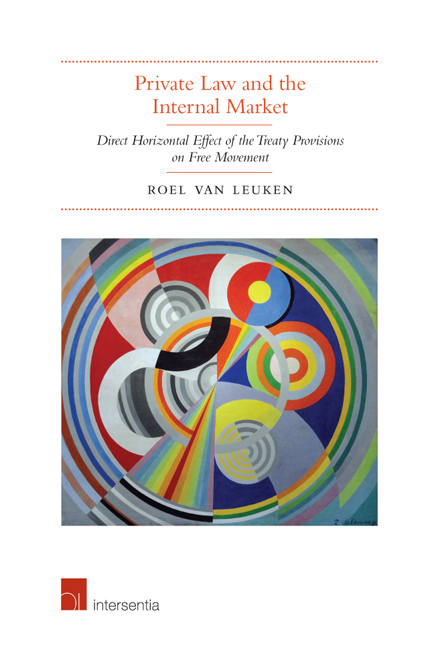 Private Law and the Internal Market
Private Law and the Internal Market Book contents
- Frontmatter
- Preface
- Contents
- Table of Cases
- List of Abbreviations
- Chapter 1 Introduction
- Part I Direct Horizontal Effect: Concept and Application in Competition Law
- Part II Direct Horizontal Effect: Internal Market
- Chapter 4 Fundamental Freedoms: Content of the Prohibitions
- Chapter 5 Case Law on Direct Horizontal Effect of Articles 45, 49 and 56 TFEU
- Chapter 6 Case Law on Direct Horizontal Effect of Articles 34 and 35 TFEU
- Chapter 7 Case Law on Direct Horizontal Effect of Article 63 TFEU
- Part III Justifications
- Bibliography
- Index
Chapter 7 - Case Law on Direct Horizontal Effect of Article 63 TFEU
from Part II - Direct Horizontal Effect: Internal Market
Published online by Cambridge University Press: 27 September 2018
- Frontmatter
- Preface
- Contents
- Table of Cases
- List of Abbreviations
- Chapter 1 Introduction
- Part I Direct Horizontal Effect: Concept and Application in Competition Law
- Part II Direct Horizontal Effect: Internal Market
- Chapter 4 Fundamental Freedoms: Content of the Prohibitions
- Chapter 5 Case Law on Direct Horizontal Effect of Articles 45, 49 and 56 TFEU
- Chapter 6 Case Law on Direct Horizontal Effect of Articles 34 and 35 TFEU
- Chapter 7 Case Law on Direct Horizontal Effect of Article 63 TFEU
- Part III Justifications
- Bibliography
- Index
Summary
INTRODUCTION
To date, the Court of Justice has not yet given a ruling on the question whether Article 63 TFEU has direct horizontal effect, which is why section 7.2. merely contains a brief discussion of two judgments in which the issue was mentioned only indirectly. In section 7.3., however, a process of combination and deduction leads to the conclusion that the Court will most likely come to accord direct horizontal effect to Article 63 TFEU, too.
CASE LAW
COMMISSION V BELGIUM (EUROBOND) (2000)
The central issue in this procedure was a Belgian measure (Royal Decree of 4 October 1994) authorising the Finance Minister to contract a public Eurobond loan to the amount of one billion German marks. Article 3, paragraph 1 of the Decree stated:
Withholding tax on interest payable on the loan is hereby waived.
Subscription by Belgian residents other than banks, financial intermediaries and institutional investors referred to in the agreements mentioned in Article 2 [which were to be concluded with the financial institutions concerned] and the conditions laid down therein is not permitted.
The definitive certificates will be delivered to the holders only on production of a certificate certifying that they are non-resident or that they fulfil the conditions referred to in the preceding paragraph.
The second paragraph of Article 3 of the Royal Decree was reflected in the agreements concluded with the financial institutions concerned. It stated:
The Bonds may not be offered or sold, directly or indirectly, to residents of, or corporations or other legal entities having their domicile in, the Kingdom of Belgium except, provided that the offer or sale does not constitute an offer to the public of the Kingdom of Belgium, to (i) a bank which is so resident or domiciled, (ii) a broker, similar intermediary or institution of international standing whose business involves dealing in securities or managing customers ‘ funds, which is so resident or domiciled and (iii) an insurance company which is so resident or domiciled.
The European Commission took the position that the second paragraph of Article 3 of the Royal Decree constituted a discriminatory barrier to the free movement of capital that was contrary to Article 63(1) TFEU, because it prohibited Belgian citizens from subscribing to a public loan issued abroad.
- Type
- Chapter
- Information
- Private Law and the Internal MarketDirect Horizontal Effect of the Treaty Provisions on Free Movement, pp. 133 - 138Publisher: IntersentiaPrint publication year: 2017


